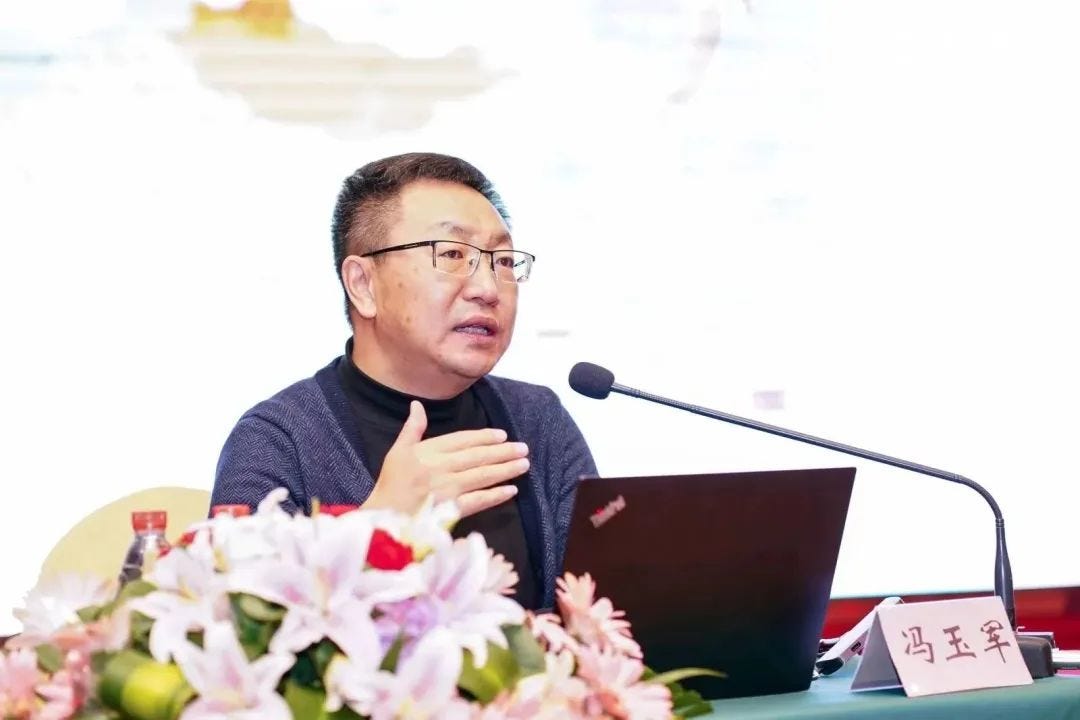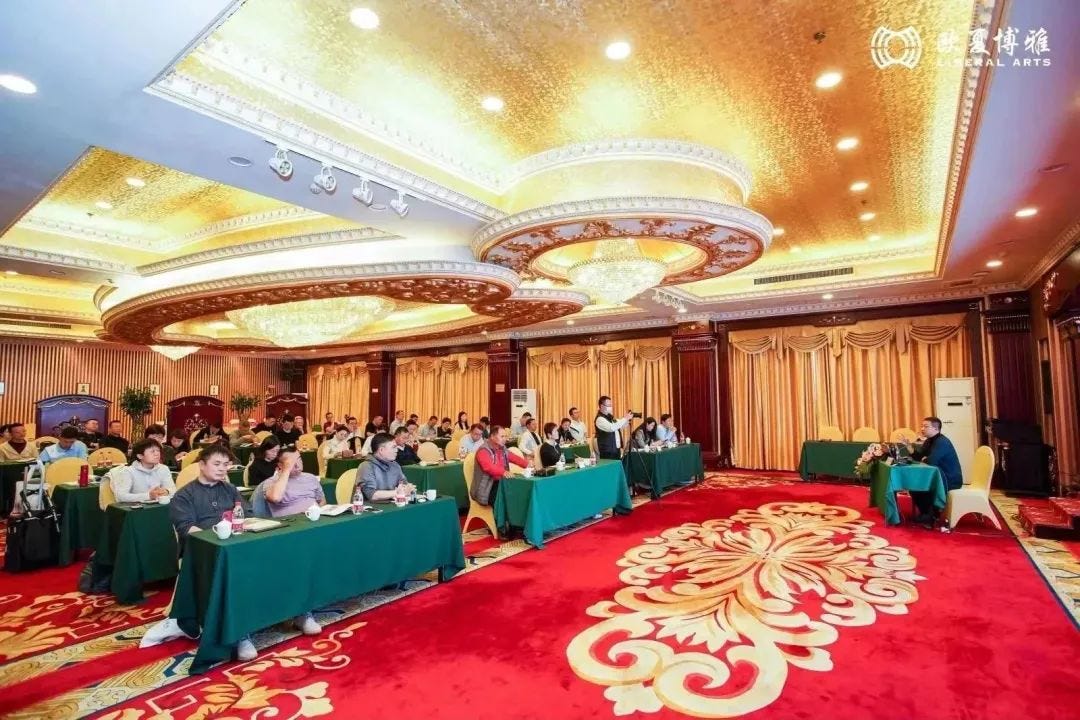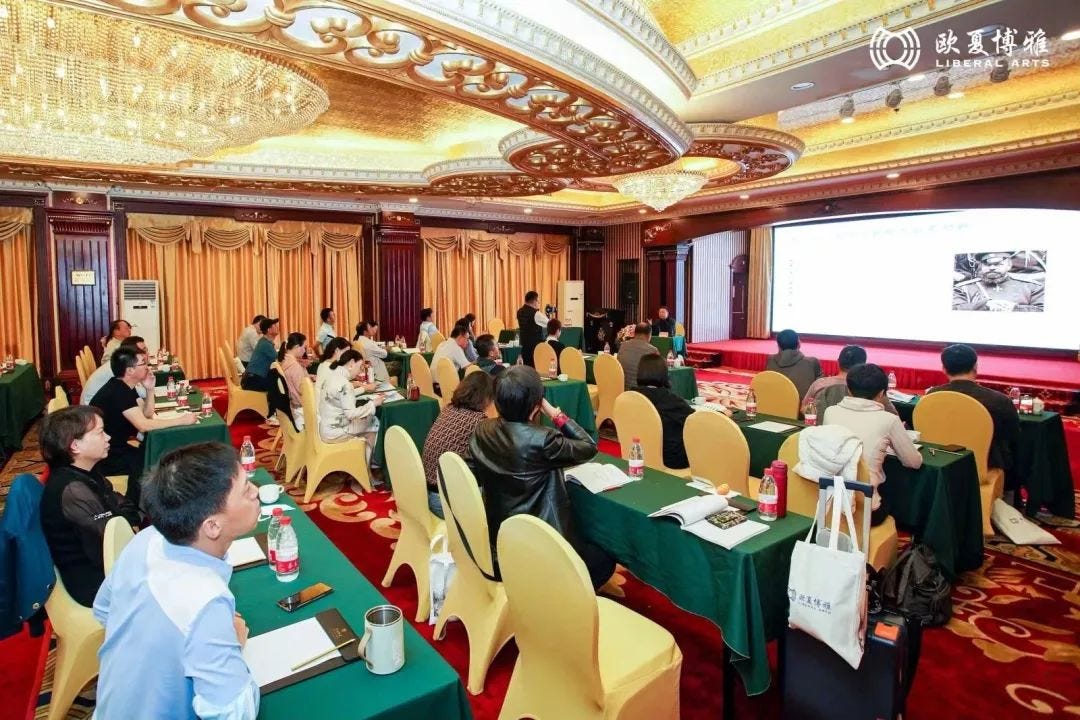Feng Yujun on Russian History, Culture, and Contemporary Development
"Measure Russia with reason," says the Chinese professor & expert on Russia
Dr. Feng Yujun is Professor and Vice Dean, Institute of International Studies, and Director at the Center for Russian and Central Asian Studies, Fudan University in Shanghai.
He was former Director, researcher, doctoral supervisor, and academic member of the Russian Institute of the China Institutes of Contemporary International Relations (CICIR), Vice President of the Chinese Association for the History of Sino-Russian Relations, Vice President of Shanghai Russian, Eastern European, and Central Asian Society.
Born in 1970, Feng graduated from Hebei University, Jilin University, and China Foreign Affairs University respectively, with a bachelor's degree in history, a master's degree in history, and a doctor's degree in law.
Feng was a visiting scholar at Vladimir National Normal University, Russia from 2000-2001, a visiting scholar at Moscow State University from 2005-2006, and a visiting fellow at Slavic Research Center of Hokkaido University, Japan, from 2010-2011.
Below is the translation of Professor Feng's speech entitled 俄国历史文化与当代发展 [1st half] [2nd half] Russian History, Culture, and Contemporary Development in December 2022 at 欧夏博雅 “Liberal Arts,” a platform where Chinese entrepreneurs organized themselves to share knowledge.
Pekingnology thanks Prof. Feng Yujun for reviewing and consenting to this translation and its publication.
Separately, Thomas des Garets Geddes, on his Sinification substack, published a translation of another recent article by Prof. Feng Yujun and co-author Wen Longjie, Postdoctoral researcher at Fudan Development Institute, Fudan University; Chief Kazakhstan correspondent, China News Service.
(Let’s just say the content stands out - couldn’t be more different - from what you typically read from China on Russia.)
Russian History, Culture, and Contemporary Development
Russia is a mirror of China. Since the 1920s, Russia has had a deep and comprehensive influence on China. A thorough study of Russian history is crucial for understanding China itself.
Sino-Russia Relations
Understanding Russia can begin with examining its relationship with China, which is relevant to many people.
Back in 1850, Lin Zexu cautioned that Russia “would be a great trouble for China in the future”. According to incomplete statistics, from 1860 to 1945, Russia caused China to lose 3.25 million square kilometers of land in 85 years. In modern times, the biggest threat China's national security had faced was also from Russia.
In history, the three alliances between China and Russia had formed ended with China paying a heavy price, and Russia benefiting greatly. The first time was after the First Sino-Japanese War, when Li Hongzhang went to Russia to congratulate the last Tsar Nicholas II on his accession to the throne and signed the "Li–Lobanov Treaty.” Russia promised to join China to build the Chinese Eastern Railway to contend against Japan. But in fact, Russia spread its influence like a flood throughout entire northeast China with the name of railway construction. The second alliance was signed between the Nationalist government and the Soviet Union after the end of the Second Sino-Japanese War, known as the Sino-Soviet Treaty of Friendship and Alliance. As a result of this alliance, China was forced to recognize the 1945 Mongolian independence referendum in Outer Mongolia that was orchestrated by the Soviet Union, leading to the loss of nearly 1.6 million square kilometers of territory immediately after China had just spent eight years fighting against the Japanese invaders. The third one was after 1949, when China and the Soviet Union formed the “Leaning to One Side” alliance.
Although this alliance allowed China to gain Soviet support, it also brought two critical impacts on China. First, the “Leaning to One Side” and “weeping the house clean before inviting guests over” ideologies completely expelled the Western powers from China, leaving China unable to integrate into the international system, resulting in China being separated from the mainstream international community until 1979. Secondly, the Soviet Union pushed China into the Korean War. This not only led to countless loss of Chinese soldiers’ lives, but also severely kneecapped China-US relations, making it difficult for China to prosper for the next several decades.
After the October Revolution, the newly formed Soviet government was in a difficult situation both domestically and internationally. To ease its own dilemma, the Russians established the Communist International in 1919 and promoted the “World Revolution”. Modern China thus had two important intersections with Russia. The first was the reorganization of the Chinese Nationalist Party/Kuomintang.
Sun Yat-sen established the First United Front policy allying with the Soviet Union, and the reorganization of the Nationalist Party was largely carried out under the guidance of the Russians. The second interaction was the founding of the Communist Party of China in 1921, under the direct guidance of the Communist International. As a branch, the Communist Party of China once followed all the guidelines by the Communist International on the Chinese revolution. For the 30 years from the 1920s to the 1950s, all major events on the Chinese political stage were influenced by Moscow. After the founding of the People's Republic of China, China’s political system, economic system, military culture, ideology, and many other aspects were all built following the Soviet model, and it has been continuously affecting China's modernization process. Of course, since the Reform and Opening Up, China has moved away from the Soviet model to some extent. However, history does not always unfold in a linear trend, and it is possible to repeat itself. Since Putin came into the office, the mutual influence between China and Russia has deepened once again.
As for cultural exchanges between China and Russia, it has been predominantly a one-way flow from Russia to China. Some scholars have summarized that "Chinese literature has become a student of Russian literature, losing its self-esteem and confidence, and bowing down to the strong influence of Russia." More importantly, over the past century, Russia has not only influenced China in terms of its institutions and culture, but has also significantly altered the way Chinese people think, transforming the excellent ideas of harmony and unity between heaven and humanity into a more polarized, dualistic way of thinking.
Some people believe that China-Russia relations are currently at their best in history. How should we understand this statement? I think there are two main reasons: First, 40 years after the Reform and Opening up, China's comprehensive national strength has far surpassed Russia, making it difficult for Russians to exert various influences over China with the same kind of superiority as before. Second, the "golden rule" of "non-alliance, non-confrontation, and non-targeting of any third party" established in the Treaty of Good-Neighborliness and Friendly Cooperation Between the People's Republic of China and the Russian Federation in 2001 has become the cornerstone of China-Russia relations. As long as this "golden rule" is upheld, there will be no major deviations in China-Russia relations.
However, today's China-Russia relations are facing many challenges. First, many Chinese people, including elites, have not yet realized the historic reversal of China's comprehensive national strength compared to Russia. Although China’s national strength is now ten times that of Russia, the biggest challenge is that many Chinese people are still subservient to Russia ideologically.
However, Russians are very sensitive to this gap. As a country with a 300-year tradition of imperial diplomacy, how can Russia willingly accept the strong rise of its neighbor? Second, there is an asymmetry in diplomatic strategic capabilities. In terms of diplomacy, China is basically led by Russia and, to a large extent, still a “little brother” who follows Russia’s orders. When facing a complex international situation, China’s closeness with Russia has actually brought many unexpected negative effects. China must realize that Russians are waging a fierce information and psychological warfare against China. Thirdly, there is an imbalance between costs and benefits. China has paid too much both economically and politically without achieving the expected results of improving China's international stance or easing the US pressure on China. The weakest party in the trilateral relationship between China, the United States, and Russia always benefits the most. In the past, when China was the weakest, aligning with the United States to counter the Soviet Union was beneficial for China; today, as Russia became the weakest, this trilateral relationship is benefitting Russia as it successfully mobilizes the conflicts between China and the United States for its own gain. China must maintain a long-term neighborly and friendly partnership with Russia while also maintaining a constructive partnership with the United States, because the China-US relations will determine China's overall international stance in the future.
Contemporary Development of Russia
On December 31, 1999, the ailing Boris Yeltsin invited Vladimir Putin to the Kremlin and handed over the reins of power to him, saying "Take care of Russia." Now, more than 22 years later, Putin has not only failed to bring about a miraculously prosperous and developed Russia, but has instead led the country into a state of miraculous decline.
During his more than 20 years in power, Putin has mainly done three things. First, politically, he has reestablished the Power Vertical, that is, he has restored a centralized government. The multiparty system and federal system established in Russia's 1993 Constitution have essentially become a dead letter. Second, economically, he has implemented oligarchic capitalism, resulting in severe inequality and difficulty in developing small and medium-sized enterprises. Third, in terms of foreign policy, he has attempted to rebuild the old Russian empire and become a major world power once again. The collapse of the Soviet Union was a painful experience for the Russian people, and Putin has been eager to restore a smaller version of the Russian empire.
Since the collapse of the Soviet Union more than 30 years ago, Russia has experienced a frightening deindustrialization. Due to a lack of investment, aging equipment, personnel losses, and broken supply chains, the former Soviet industrial system is in ruins. Russia has basically become a country that relies on the selling of natural resources. In the context of the current global economic system, Russia can only play the role of an oil or coal salesman. As the weaknesses of the Russian military were exposed during the Russia-Ukraine Conflict, the market for Russian arms has also suffered. In this situation, Russia's economy has fallen out of the top ten in the world, making it largely a second-rate power.
More importantly, there are a lot more negative impacts of the Russia-Ukraine Conflict on Russia. Currently, Ukraine has launched a counteroffensive, and the war has entered a phase of attrition and stalemate. Politically, Russia has been widely isolated, the United Nations General Assembly had voted three times with an overwhelming majority to strongly condemn Russia's aggression. Economically, Russia has faced unprecedented economic sanctions, with more than $300 billion in overseas assets frozen, overseas financing restricted, strict controls on its imports and exports, and more than 1,000 multinational companies leaving the Russian market. In history, the failure of international conflicts often leads to subversive changes within Russia. The failure of the Crimean War in 1856 led to its Emancipation reform. The failure of the Russo-Japanese War in 1905 sparked the 1905 Revolution. The defeat in World War I led to the February and October Revolutions. The failure of the war in Afghanistan was also an important factor in the dissolution of the Soviet Union. Today, this war is also likely to become a major turning point in Russia's development.
The strategic competition between China and the US focuses more on technological innovation, financial capabilities, and the influence on global governance, while Russians are still most concerned with occupying territory and land, and controlling resources. This war is not just Putin's war, but also the Russian nation's war, constructed by the “obsession” of the Russian Empire in their mentality. The majority of Russians still hold outdated ideas, and it is precisely these old ideas being brought up again in the current global circumstance that have led to the Russia-Ukraine war. Of course, the consequences of this war will eventually be borne by the entire Russian state and nation.
Historical Progress and Civilization Evolution
In 862 AD, the earliest state of the Russian people - Kievan Rus - emerged. Since the establishment of Kievan Rus, Russia has been influenced by the Viking culture in the north, the Byzantine culture in the south, and the nomadic culture of the surrounding Asian nomads.
In 988 AD, Grand Prince Vladimir of Kiev accepted Eastern Orthodox Christianity from the Byzantine Empire and performed the baptism of Rus. This not only made Kievan Rus a part of the Christian world, but more importantly, it allowed Kievan Rus to accept the political culture of the Byzantine Empire - the system of autocracy.
From 1240 to 1480, the Russians were subjected to the rule of the Mongolians for 240 years. The Mongolians' way of life, political system, and religious beliefs have all had subtle influences on Russia. "Scratch at the Russian and underneath you will see the Tatar." The Russian Eurasianist school of thought in the early 20th century believed that the Russian idea of uniting the entire continent into a whole country originated from the Mongolians, and the real history of Russia is the coexistence of Russians and Tatars as neighbors. As Nikolai Berdyaev said, "...and within the Russian soul two principles are always engaged in strife - the Eastern and the Western."
In summary, it can be said that the Byzantine culture and the Mongolian culture are the two most important roots of Russian culture.
Russian culture is unique, and Russians have adopted a very effective skill in modern times to shape their image as mysterious. Churchill once said, "Russia is a riddle wrapped in a mystery inside an enigma." Frederick Engels alsosaid, "Russian diplomacy has succeeded in soft-soaping the two great Bourgeois parties of Europe. To be Legitimist and Revolutionist, Conservative and Liberal, orthodox and ‘advanced,’ all in one breath, is permitted to Russia, and to Russia alone.” Putin has also been using this conservative ideology to win support in the international community in recent years.
In the 1920s, U.S. historian Mary Platt Parmele pointed out in A Short History of Russia that Russia needed to do three things: "With such a vast territory, an incalculable national wealth, the most loyal, simple and diligent peasant class, a deep sense of national pride and strong patriotism, what else does Russia need? Only three things: to cast out cruelty, to effect homogeneity, to establish a government which shall be just." However, after a century ,the three things remain unfinished.
Political Culture
In 1832, the Russian Minister of National Education, Sergei Semenovich Uvarov, summarized the three pillars of the official Russian ideology: Eastern Orthodoxy, the authoritarian system, and the people. Eastern Orthodoxy was considered the foundation of Russian social, moral, and cultural development and an important factor that Russian distinguished Russia as spiritually superior to Western Europe. The authoritarian system ensured political stability in Russia, while populism was a combination of religion and authoritarianism, mainly expressed through people's devotion to Eastern Orthodoxy and loyalty to the Tsar.
There are two core values in Russian political culture. Firstly, nationalism. Deeply rooted in the national consciousness of Russia is the denial of the sanctity of private property and the belief that the interests of the state are above all else. Second, authoritarianism, which is the core of Russian political culture. Politically, since the Grand Duchy of Moscow, Russia has established a centralized system of government. Economically, the monarch controlled the country's economic lifeline, and there was no aristocratic economy. Socially, individual rights were disregarded.
From the Grand Duchy of Moscow to the Russian Empire, the Soviet Union, and contemporary Russia, the political culture has been characterized by a long-term stable authoritarian system. In the 16th century, Ivan the Terrible turned traditional feudal lords into servants of the state. During Peter the Great's reign, he established the Table of Ranks, which greatly increased the number of government officials and created a powerful bureaucratic class, further integrating the autocratic monarchy and bureaucratic system in Russia. During the reign of Nicholas I, the Third Department, a police agency for political security, was established. Russia became a bastion of European authoritarianism, and the Russian, Prussian, and Austrian Emperors formed the Triple Alliance to suppress the European revolution. Despite the reforms during the reigns of Alexander II and Nicholas II, in which Russia learned from the West and adjusted its administrative and judicial systems, the core of absolute autocracy under the Tsar never changed.
As Alexis de Tocqueville once said in The Old Regime and the Revolution, “The most perilous moment for a bad government is one when it seeks to mend its ways.”Therefore, delaying and suppressing reforms as much as possible is a top priority for those in power. In Russian history, every modernization movement has been overshadowed by subsequent reactionary movements. After Peter the Great and Catherine the Great's reforms came a wave of reactionary movements. After Alexander II's reforms came a wave of reactionary movements led by Nicholas I. During the Soviet era, after Khrushchev's reforms, there was a long period of stagnation under Brezhnev's reactionary rule for 17 years. This is the complex and paradoxical nature of history.
After the May Fourth Movement, why did China ultimately choose the Russian model instead of the Western model? I believe this is because China shared many similarities with the political culture of Russia such as historical monarchy, bureaucratic society, small-scale agriculture, undeveloped market economy, disregard for individual rights, emphasis on collectivism, and obsession with unity. With the combined influence of active choices and external inputs, China ultimately accepted a Russian-style development path.
Economic Model
There are five basic characteristics of the Russian economy.
Firstly, it is monopolistic. Starting from the Grand Duchy of Moscow, big commercial capital in Russia has dominated the economy. Under Peter the Great, Russia began the process of industrial modernization, and the government implemented measures such as the poll tax to support large industrial and commercial owners. By the end of the 19th and early 20th centuries, industry had developed rapidly, and large monopolistic organizations had emerged in all major sectors, especially in heavy industry. This hindered technological innovation, disrupted market order, exploited surplus value from workers, and gradually intensified class conflicts. The complex relationship between officials and businesspeople also led to interest groups hijacking national decision-making, which greatly influenced Russia's modernization. Political issues have their economic roots, and the two are inseparable.
Another very important feature of the Russian economy is mercantilism and severe tariff barriers. Starting from the 18th century, trade frictions between Russia and European countries often led to trade wars. Although Russia is in the WTO today, it still maintains high tariffs. At the same time, Russia attracts foreign investment, but its protection of foreign capital is very weak. Foreign capital, when developed, often becomes a target for attacks, destruction, and even expropriation.
Secondly, the Russian economy is coercive. The state apparatus severely exploited the economy. In the Kievan Rus period, Russia implemented Poliudie. In late autumn and early winter each year, the grand prince led his guards to each household to collect tribute such as fur, honey, and beeswax from residents. The Poliudie teams were ruthless, robbing property and even capturing people and selling them as slaves. From the 15th to the 16th century, while serfdom was declining in Europe, it experienced a resurgence in Russia, becoming the most prominent feature of the Russian economy. In the Soviet era, there were also Gulag Forced Labor Camps. From 1929 to 1953, 15 million people were imprisoned in the Gulag labor camps throughout the Soviet Union to perform hard labor, equivalent to one-tenth of the total population as at that time, the population of the Soviet Union was only 160 million.
Third, Russian economy relies on natural resources. From Tsarist Russia to the Soviet Union and to this day, Russian agriculture remains dependent on the nature. Apart from relying on land, the fur trade was a prosperous industry for Russia from the 16th to the 17th century, becoming an important pillar of the Russian economy and a driving factor for its expansion. In the late 19th and 20th centuries, as industry became increasingly reliant on oil, Russia also relied on oil and gas as an important source of foreign exchange earnings.
Fourth, structural singularity. This is a long-term problem of the Soviet economy. The reliance on heavy industry was too heavy, with too light reliance on the light industry.
Finally, the Russian economy has always tried to play catch-up. As a late-developing country compared to Europe, Russia has always tried to cross the "Caudine Valley" to achieve catch-up development. Starting from Peter the Great's reforms, Russia has always used whips and sticks to force its people to strive to catch up with advanced Europe. Russia's modernization process was led by the state, and in order to achieve specific goals, all resources were concentrated in specific areas, leading to negative effects. On the one hand, it resulted in the distorted development of the economy. By oppressing the peasants, the original accumulation of capital was achieved with the “price scissors” between industry and agriculture. On the other hand, it suppressed entrepreneurs and intellectuals with free ideas. The goal of modernization should be focused on the fundamental modernization of people's minds. However, late-developing countries often treat people as tools rather than the fundamental starting point and destination of national modernization.
Social Ideology
From the baptism of Rus' in 988, Orthodoxy has been the most profound intellectual force influencing Russian society. Eastern Orthodoxy has two important characteristics: first, the dependence of religious authority on imperial power, and second, the mysticism and conservatism of its doctrine.
In the eyes of the Westerners, it was the acceptance of Eastern Orthodox Christianity that caused Russia to break away from the Western community. After the Decembrist Revolt, there was a fierce ideological debate between the Westernizers and the Slavophiles in the Russian intellectual circles regarding the path of development for Russia. The central issue of the debate is whether Russia should renew and recreate its entire society according to the Western model, or should it reform its Eastern Orthodox Church and village communities based on its national conditions and partially borrow from Western Europe's experience to form the foundation for Russia's future development.
The prominent Westernizer, Pyotr Chaadayev, pointed out in his famous work Philosophical Letters the marginal status and isolation of Russia in human civilization and deeply reflected on the gap between Russia and the West. However, the Slavophiles believed that Russia has had excellent cultural traditions since ancient times, and it would be disastrous if it abandons its own cultural traditions and follows the Western path.
If Slavophilism has a tendency towards narrow nationalism, then Pan-Slavism is purely national chauvinism. Russians have always believed that they are the best representatives of the entire Slavic peoples, and have the ability and obligation to protect the entire Slavic peoples. This set of ideas largely induced World War I. As Frederick Engels said, "Pan-Slavic unity is either pure fantasy, - or a Russian whip." [FIGHT IN HUNGARY. PSS K. Marx and F. Engels. T.6 p. 180-186]
There is also a very important faction of Russian social thinking - the Populists. From Herzen, to Chernyshevsky, to Bakunin, populism gradually evolved into radicalism.
In the 1870s, the Populists splitted into three factions: one faction was led by Bakunin, an activist in the anarchist movement and a populist ideologue who advocated Pan-Slavism. He believed that private ownership, the state, and the church were the three major enemies and called for a people's uprising to pursue freedom; another faction was led by Lavrov, who had participated in the First International meeting and the Paris Commune, advocated relying on the people to carry out social changes and doing revolutionary propaganda work, thus this faction is also known as the "propagandist faction"; the third faction was led by Tkachev, who believed that revolutionary activities are double-sided, there are the destructive and constructive aspects of revolution.
Although the three factions had different views, their main content was agrarian populism and utopian socialism. Russian socialism has fundamental differences from Marxism and is largely influenced by the combination of Russian Orthodox traditions, authoritarianism, the village community system (Obshchina), and extremist ideology of the Populist movement, ultimately leading to the development of Stalinism.
There is a strong Messianic complex in Russia's social ideology, with Russians considering Eastern Orthodoxy as the most authentic form of Christianity, while Catholicism and Protestantism have deviated from the original teachings. Russians believe that they have a great "mission" to save the Christian world and all of humanity. This strong sense of mission provides internal motivation for Russia's drive towards greatness, but it also fosters chauvinistic tendencies towards weaker nations and encourages Russia's massive expansion. Russia often uses the name of rescuing other nations to suppress them, and its colonialism, unlike the British and French colonization which was for economic gain, was an unlimited greed for land, killing and occupation.
The drive towards expansion also stems from Russians' strong sense of insecurity, from both the ordinary people and their highest leaders, all believing that the outside world is hostile towards them. This has also led Russia to adopt a strategic culture that instills fear in others. Russia's main source of international influence is not its cultural soft power or economic power, but rather its destructive capabilities.
In recent years, Alexander Dugin's geopolitical views have become mainstream in Russia's social thought. However, an excessive emphasis on geopolitics may ultimately become a self-fulfilling prophecy, and to a large extent, it puts Russian society in a dangerous situation. The more Russia focuses on geopolitics and invests resources in it, the more difficult it is to avoid conflicts with other countries. At the same time, the imperialist view still affects Russia today. From the 2008 Russia-Georgia war to the 2014 Crimea crisis and the current Russia-Ukraine Conflict, they are all results of Russia's imperialist tendencies.
National Psyche
There are six main characteristics of the Russian national psyche.
Firstly, it is contradictory and extreme. According to Berdyaev, Russia often moves from one extreme to another. This psychological trait applies not only to the overthrow of the stable culture and history within the country, but also to the formation of a confrontational mentality in the international system.
Secondly, it is a religious form of Russian "humanitarianism". However, its humanitarianism is vastly different from that of the West. Western humanitarianism originated from the Renaissance, mainly directed against religion and theology, emphasizing the use of reason to oppose superstition and using human capabilities to counteract God's omnipresence. Russia, on the other hand, had neither the Renaissance nor the Reformation; its humanism is a theistic humanitarianism that brings the Orthodox thought to the secular world, hoping for a God to rescue humanity from suffering and ensure its humanization.
Thirdly, theistic humanitarianism also leads to another important psychological characteristic of Russia - irrationality. The peculiarity of its type of thinking lies in the fact that it is based on intuition. The growing spread of irrational psychology in social politics gave rise to voluntaristic tendencies, legal nihilism, and the principle of moral priority.
Fourthly, there is the commonality, which stems from Russia's ancient communal life and the "cohesiveness" of the Orthodox Church. This led to a Russian egalitarianism, unprogressiveness, dependence on others, anti-bourgeoisness, etc., which were completely opposed to what Marx Weber described as The Protestant Ethic and the Spirit of Capitalism.
Fifthly, it is a consciousness on suffering. For Russians, suffering is the only way that leads an individual's journey to seek salvation from God. Of course, the numerous sufferings in Russian history were due to natural factors, institutional and cultural factors, but this masochistic mentality is also an important reason.
Sixthly, this mentality also breeds a victim mentality and exclusivity that triggers the insecurity and strategic culture of instilling fear in others as discussed above.
These characteristics of the Russian national psyche are reflected to a great extent in the Russian drinking culture. Russians don't need to be persuaded to drink, they drink on their own, with the purpose of getting themselves drunk. After drinking, Russians, who are usually very indifferent, may burst into tears, reflecting the contradictory Russian temperament of being both expansive and vulnerable.
The strength of Russia lies not in its power, but in its weakness. Russian diplomacy is not good at defending its position, but often surprises others with unexpected moves and turns defeat into victory. When Russia is in a favorable position, strategic errors may occur, but when it is in trouble, it will adopt unexpected measures to regain strength and rise again.
The Russian poet Fyodor Tyutchev once wrote, “Russia cannot be known by the mind/ Nor measured by the common mile:/ Her status is unique, without kind-/ Russia can only be believed in.”
However, I believe as Russia’s development is so complex, China should not simply believe in and blindly follow it, but to study , understand and eventually gain insight into this country in a multidimensional space where historical development, international comparison, Chinese national interests and common values of all mankind come together. (Enditem)
Some previous coverage of the war in Ukraine via Pekingnology
A week ago, Henry Huiyao WANG, founder and President of the Center for China and Globalization (CCG), wrote in his column on the South China Morning Post:
















Detailed and informative analysis of Russia's complex history and culture since the ninth century from the Chinese intellectual perspective. Also, an interesting point in discussing why China chose the Russian instead of Western model in the twentieth century that "China shared many similarities with the political culture of Russia such as historical monarchy, bureaucratic society, small-scale agriculture, undeveloped market economy, disregard for individual rights, emphasis on collectivism, and obsession with unity."